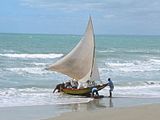Lugger
Appearance

A lugger is a class of boat, widely used as traditional fishing boats, particularly off the coasts of France, England and Scotland. It is a small sailing vessel with lug sails set on two or more masts and perhaps lug topsails.
The name

According to Skeat, term "lugger" may come from Dutch, logger meaning "slow ship", and East Friesian, log meaning "slow" or it may come from the type of sail used (lug), which may derive from the ease with which it may be raised or "lugged".[1]
Local types
- British Isles
- Coble (not strictly a lugger as cobles have only one mast), used on the English east coast from Yorkshire to Northumberland
- Cornish lugger
- Fifie, a herring drifter of the Scottish east coast
- Hastings lugger
- Manx nickey
- Manx nobby
- Sgoth Niseach, dipping lug

- Continental Europe
- Barca-longa, of the Iberian and Mediterranean coasts
- Breton chasse-marée
- French lugger (lougre), of the coast of Normandy
References
- ^ Skeat, Walter W. (2013). An Etymological Dictionary of the English Language. Dover language guides (Reprint ed.). Courier Corporation. p. 832. ISBN 9780486317656.
See also
- Mystery, lugger
- Spirit of Mystery, replica of the lugger Mystery
- Sophie Theresia (herring lugger)
- Leopold Janikowski sailed in a lugger to Cameroon in 1882
Further reading
- Shearwood, Ken (1972) Evening Star: the story of a Cornish lugger. Truro: D. Bradford Barton
External links
Look up lugger in Wiktionary, the free dictionary.
- Cornish Luggers: an online guide
- Cornish Luggers: an online guide; Beer luggers (formerly in use on the south Devon and Dorset coasts)


